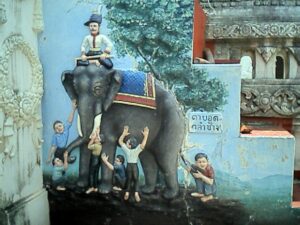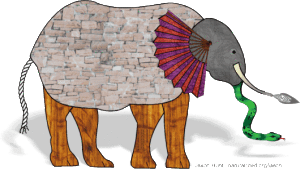Once upon a time, a parable was created that became well known across the world. “Six Blind Men And The Elephant” is a poem that  describes how people interpret events and encounters very differently due to mindsets we develop through our individual life experience – mindsets that act as filters, coloring our perceptions of those events and encounters. These fundamental differences between people can lead to disagreement, conflict and confusion.
describes how people interpret events and encounters very differently due to mindsets we develop through our individual life experience – mindsets that act as filters, coloring our perceptions of those events and encounters. These fundamental differences between people can lead to disagreement, conflict and confusion.
I am convinced that these different mindsets impact the behavior and communication of leaders as well as the way people on the receiving end interpret that behavior and communication. If you’re interested in learning about yourself and others, and/or if you’re a leader who wants others to truly understand your decisions, rationale, vision, and priorities, this 3-part series is for you.
There are myriad recordings of this story on Youtube.com. I like this one:
Following is the poem below by John Godfrey Saxe (1816-1887)
It was six men of Indostan
To learning much inclined,
Who went to see the Elephant
(Though all of them were blind),
That each by observation
Might satisfy his mind.
The First approach’d the Elephant,
And happening to fall
Against his broad and sturdy side,
At once began to bawl:
“God bless me! but the Elephant
Is very like a wall!”
The Second, feeling of the tusk,
Cried, -“Ho! what have we here
So very round and smooth and sharp?
To me ’tis mighty clear
This wonder of an Elephant
Is very like a spear!”
The Third approached the animal,
And happening to take
The squirming trunk within his hands,
Thus boldly up and spake:
“I see,” quoth he, “the Elephant
Is very like a snake!”
The Fourth reached out his eager hand,
And felt about the knee.
“What most this wondrous beast is like
Is mighty plain,” quoth he,
“‘Tis clear enough the Elephant
Is very like a tree!”
The Fifth, who chanced to touch the ear,
Said: “E’en the blindest man
Can tell what this resembles most;
Deny the fact who can,
This marvel of an Elephant
Is very like a fan!”
The Sixth no sooner had begun
About the beast to grope,
Then, seizing on the swinging tail
That fell within his scope,
“I see,” quoth he, “the Elephant
Is very like a rope!”
And so these men of Indostan
Disputed loud and long,
Each in his own opinion
Exceeding stiff and strong,
Though each was partly in the right,
And all were in the wrong!

Lee G. Bolman and Terrence E. Deal authored an excellent book on leadership, “Reframing Organizations – Artistry, Choice and Leadership”. This book is a valuable, relevant book for organization leaders who want to understand the perspectives of people throughout the organization and leverage that understanding to build performance through cohesion and engagement.
Bolman and Deal describe the 4 “frames” or perspectives, windows, mindsets — that we all have. Like personal characteristics, people have mindsets including all four frames, but, usually, one frame is dominant in influencing an individual’s thinking.
The 4 frames are:
- Structural
- Human Resources (note: this does not refer to the Human Resources staff or function)
- Political
- Symbolic
I view each frame as a tool for leaders.
- The Structural frame helps leaders to organize people and systems to formalize roles and get things done.
- The Human Resources frame enables leaders to bring the best out in their people by developing an environment that helps people to motivate themselves and to bring their energy and ideas to the workplace.
- The Political frame supports leaders in building effective working relationships and successfully obtaining resources needed to succeed in competitive business environments.
- And, the Symbolic frame provides a leader with the means to attach meaning to work, and to convey his intended meaning and rationale in decision making and communications, so that everyone takes away the messages he intends to convey.
In Part 3, we’ll discuss each of the 4 frames in detail.
Thank you for reading Part 2! What are your thoughts on the parable? Have you heard this before? How do you believe this relates to leadership? Please share your thoughts, ideas, opinions and comments.
